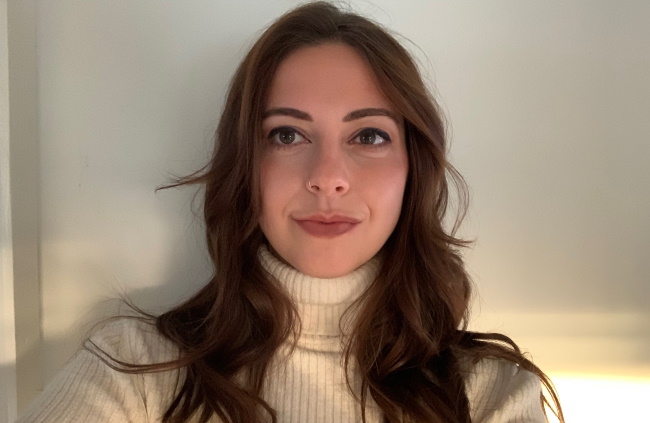
Focus On: Madelaine Hare and Graduate Mentorship in Higher Education
November 14, 2022
Highlighting research by members of the Canadian library and information management community.
Researcher: Madelaine Hare
Master of Information (MI) Candidate, School of Information Management, Dalhousie University
What is your research topic?
My research focuses on graduate mentorship in higher education. My current work looks at how the research behaviours of PhD advisors in Library and Information Science impacts the research performance of advisees. Though existing research on academic mentorship demonstrates its positive impact on research productivity, its effect on students’ academic careers is in need of further study. My work explores the relationship between the publishing patterns of students and their advisors in LIS in North America using a bibliometric approach. It finds that the doctoral mentorship relationship may play a significant role in student research performance: advisor coauthorship with advisees helps to increase the latter’s research output and impact and sharing similar research interests with an advisor results in higher student productivity.
This research contributes to scholarship on the value of doctoral mentorship and provides insight into the academic LIS network, authorship, and advisor-advisee scholarly interaction and output. Mentorship in higher education is a topic that I feel merits deep consideration and further study; effective mentorship is a determining factor in many students’ academic and professional success. I hope to encourage discourse on how we can support graduate students in their skill development and facilitate their success in academia and in the labour market.
What interested you in that topic?
I am very interested in processes of learning and teaching in both academic and non-academic contexts. There is a diversification of PhD student career paths; mentorship plays a pivotal role in the intellectual training of students and in their skill development. I am fascinated by advisor and advisee’s perceptions of this relationship and with using quantitative methods like bibliometrics to measure relationship outcomes.
What impact would you like to see your research have on LIS practitioners?
LIS is wonderful in the ways that it champions teaching and instruction geared towards the patrons we serve. I hope that my research can in turn highlight the importance of mentorship and effective teaching for graduate students, and help bridge existing gaps in their academic and professional development. My hope is that my research can offer strategies for doctoral students to apply, shed light on the invisible contributions of mentors, and bring more attention to the importance of advisor-advisee relationships and the ways in which they impact the intellectual and professional development of students.
What emerging topics do you foresee in the future of LIS research?
Pedagogy is experiencing tremendous change in higher education as a result of the Covid-19 pandemic. I am particularly interested in seeing how digital pedagogy strategies develop as we adapt to hybrid and online learning, and Open Educational Resources and Massive Open Online Courses proliferate across the web.
I also am fascinated by developments in evidence synthesis. Though it is mainly applied in health sciences research, I have witnessed its methods become more prevalent across disciplines and wonder how LIS practitioners will adapt these methods and skills in order to assist researchers from a diverse range of fields.
I also foresee more dialogue surrounding Open Access in general, as institutions explore transformative agreements, different OA models are adopted, and publishers pursue new avenues, such as eLife’s decision to depart from the traditional accept/reject peer review model. I think the way we are sharing research will see a lot of change in the next decade.
What advice would you give to LIS students or practitioners hoping to engage in research?
I would advise LIS students or practitioners to follow what piques their curiosity. I believe that we can make novel insights and meaningful connections when we allow ourselves to be creative and explore topics and ideas. The literature I’ve studied in my research suggests that intellectual diversification and the ability to synthesize many ideas to develop new insights leads to greater academic success down the line. This indicates to me that giving ourselves the freedom to creatively engage with topics may yield surprising outcomes; the interdisciplinary nature of LIS places us well to do this. If an idea intrigues you, or you suspect something might be worth investigating further, go down the rabbit hole; you have a unique perspective that can produce important contributions.
Select Bibliography
Hare, M., & Mongeon, P. (2022). Mentorship and the Research Performance of LIS PhDs. Metrics 2022: ASIS&T Virtual Workshop on Informetrics and Scientometrics Research. Conference Proceedings. Virtual Workshop, October 8-9, 2022.
Hare, M., & Mongeon, P. (2022). The Impact of Mentorship on the Research Performance of LIS PhDs. The 26th International Conference on Science, Technology and Innovation Indicators. Conference Proceedings. Granada, September 7-9, 2022.
Hare, M. (2021). Less “Determined in His Purpose” than “Sincere in His Wishes”: Amelioration at Henry Goulburn’s Amity Hall Estate, Jamaica, 1825-1833. [Master’s thesis]. Dalhousie University.
Add a new comment